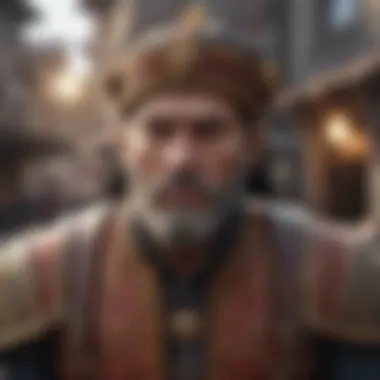Unveiling the Intricacies of Townsmen: A Deep Dive into Their World


Game Reviews
In this section, we delve deep into the intricate world of townsmen through the lens of a comprehensive game review. From the historical significance to their societal roles, this review aims to provide a nuanced exploration of townsmen in a manner that intrigues both gamers and Nintendo fans. Let's embark on this journey together.
Overview
The overview of townsmen sets the stage for our exploration, painting a detailed picture of their significance in various historical contexts. From ancient civilizations to modern urban landscapes, townsmen play a crucial role in shaping the fabric of society. Understanding this overview is essential to grasp the layers of complexity that surround townsmen.
Gameplay
When it comes to the gameplay of townsmen, we unravel the mechanics that govern their interactions within the societal framework. Much like navigating a complex game world, townsmen must strategize and adapt to ever-changing environments and challenges. Exploring their gameplay dynamics sheds light on the skills and attributes they bring to the table.
Storyline
The storyline of townsmen is a rich tapestry woven with tales of triumphs, struggles, and triumphs. As we uncover the threads that shape their narrative, we gain a deeper appreciation for the historical context in which townsmen thrive. The storyline offers valuable insights into the evolution of townsmen and their enduring impact on society.
Graphics
Delving into the graphics of townsmen allows us to appreciate the visual aesthetics that accompany their portrayal. Whether in historical paintings or modern-day illustrations, the graphics form a crucial element of understanding the townsmen's world. By examining the graphics, we can grasp the artistic nuances that enhance our perception of townsmen.
Soundtrack
The soundtrack of townsmen adds a new dimension to our exploration, immersing us in aural landscapes that evoke emotions and sentiments. By delving into the sounds that accompany townsmen, we deepen our connection to their world and experience a sensory journey unlike any other. The soundtrack sets the mood and ambiance for our understanding of townsmen.
Pros & Cons
As we weigh the pros and cons of townsmen, we gain a balanced perspective on their various attributes and shortcomings. By examining their strengths and weaknesses, we can appreciate the nuances and complexities that define townsmen as multifaceted beings. Understanding the pros and cons helps us form a well-rounded view of townsmen.
Final Verdict
To wrap up our game review of townsmen, we present a final verdict that encapsulates our insights and analysis. This verdict serves as a culmination of our exploration, offering a conclusive assessment of the intricate world of townsmen. Join us in this final verdict to glean a holistic understanding of townsmen.


Introduction to Townsmen
Embark on a comprehensive journey delving into the multifaceted world of townsmen. This section serves as the cornerstone, laying the foundation for unraveling the complexities surrounding townsmen. By exploring the historical significance and societal roles of townsmen, this article aims to offer a nuanced perspective on a crucial aspect of urban development.
Defining Townsmen
Townsmen, as a term, has undergone a significant evolution through time, reflecting the changing dynamics of urban life. The Evolution of the Term sheds light on the metamorphosis of townsmen from ancient to modern times, underscoring the shifts in societal structures and economic paradigms. Delving into the Socio-Economic Context of townsmen provides a deeper understanding of their roles within the broader framework of society, highlighting the intricate interplay between economic activities and social hierarchies. These definitions are vital in elucidating the fabric of urban culture and the functions of townsmen within it.
Historical Perspectives
Tracing back to Ancient Origins, townsmen played pivotal roles in shaping early urban environments, contributing to the foundation of civilized societies. The distinctive characteristics of Ancient Origins reveal the ingenuity and adaptability of townsmen amidst historical challenges. Transitioning to the Medieval era, the emergence of Medieval Townsmen signifies a shift towards more structured urban societies, emphasizing craftsmanship and trade as integral components of town life. Exploring these historical perspectives provides valuable insights into the evolution of urban centers and the enduring legacy of townsmen.
Cultural Significance
The Cultural Significance of townsmen permeates through literary and artistic expressions, capturing the essence of urban life across different epochs. Literary Representations offer glimpses into the perceptions and narratives surrounding townsmen, reflecting societal values and aspirations. On the other hand, Artistic Depictions immortalize the aesthetic allure and vibrancy of town life, revealing the intricate details of urban landscapes and societal interactions. By delving into these cultural aspects, one can unearth a trove of historical and artistic interpretations of townsmen's roles, further enriching our understanding of urban culture.
Roles and Responsibilities
Roles and responsibilities play a pivotal role in unraveling the intricacies of townsmen in this comprehensive exploration. Understanding the various tasks and duties assigned to individuals within a community sheds light on the social fabric and functioning of town life. Through delineating specific elements such as occupational diversity, community dynamics, and economic contributions, the article aims to provide a nuanced understanding of the roles and responsibilities held by townsmen.
Occupational Diversity
Occupational diversity within townsmen communities encompasses a wide array of roles, each serving a distinct purpose in the societal framework. Craftsmen and artisans, known for their exceptional skill in crafting goods, contribute significantly to the town's economy and cultural ethos. Their meticulous craftsmanship and creativity shape the material culture of the town, reflecting the values and aesthetics of the community. On the other hand, merchants and traders play a vital role in facilitating trade and commerce, connecting the town to external markets and fostering economic growth. Their acumen in negotiation and business dealings influences market trends and the town's prosperity, making them indispensable figures in the urban landscape.
- Craftsmen and Artisans: Craftsmen and artisans possess a unique ability to transform raw materials into exquisite products, showcasing their craftsmanship and artistic prowess. Their dedication to honing traditional techniques and innovating new designs sets them apart as cultural custodians and economic contributors. While their specialization in specific trades offers them expertise, it also limits their scope for diversification, posing challenges during economic fluctuations and changing consumer preferences.
- Merchants and Traders: Merchants and traders thrive on the dynamics of supply and demand, leveraging their networks and business acumen to broker deals and expand market opportunities. Their role in bridging local producers with regional and international markets strengthens the town's economic networks and fosters wealth creation. However, the unpredictable nature of trade exposes them to risks and uncertainties, requiring strategic planning and resilience to navigate through market fluctuations.
Community Dynamics
Community dynamics in townsmen societies delineate the power structures, social relationships, and governance systems that govern daily interactions and decision-making processes. Local governance mechanisms are essential for maintaining order and justice within the town, ensuring that regulations are enforced and disputes are resolved effectively. The establishment of governing bodies and leadership positions reflects the town's values and priorities, shaping the social norms and collective identity of its residents. In parallel, social interactions among townsmen foster solidarity, cultural exchange, and mutual support, strengthening social cohesion and harmony within the community.
- Local Governance: Local governance structures oversee the implementation of laws and regulations, mediating conflicts and upholding civic virtues for the greater good of the town. Their adherence to ethical standards and transparent practices instills trust among residents and instigates civic responsibility, promoting active participation in town affairs. While the hierarchical nature of governance may concentrate power within select individuals, the accountability and inclusivity of decision-making processes are vital for ensuring equitable representation and social justice.
- Social Interactions: Social interactions serve as the social glue that binds townsmen together, creating networks of support, camaraderie, and cultural exchange. Shared traditions, festivities, and rituals foster a sense of belonging and identity among residents, nurturing a vibrant community life enriched by diversity and mutual respect. However, the complexities of interpersonal relationships may give rise to conflicts and misunderstandings, necessitating effective communication and conflict resolution strategies to maintain social harmony and collective well-being.


Economic Contributions
Economic contributions form the backbone of townsmen societies, driving innovation, prosperity, and sustainable development through market influences and wealth distribution mechanisms. Market influences shape the economic landscape of the town, dictating consumer behavior, pricing strategies, and product demand. Understanding market dynamics enables townsmen to adapt to changing market trends, capitalize on emerging opportunities, and mitigate risks associated with competitive markets. Moreover, wealth distribution practices dictate the equitable allocation of resources and wealth among town residents, ensuring socio-economic stability and inclusive growth.
- Market Influences: Market influences exert a significant impact on the town's economic growth, influencing investment decisions, business strategies, and consumer preferences. Townsmen leverage market insights to strategize their businesses, introduce new products, and expand their market reach, capitalizing on consumer demand and emerging trends. However, market volatility and external shocks pose challenges to market stability, necessitating adaptive measures and risk management strategies to safeguard the town's economic interests.
- Wealth Distribution: Wealth distribution mechanisms play a crucial role in reducing income disparities, promoting financial inclusion, and fostering community prosperity. Fair distribution of wealth ensures that all town residents have access to essential resources, quality services, and economic opportunities, enhancing social mobility and reducing poverty levels. However, disparities in wealth distribution may create social divisions and economic imbalances, necessitating policy interventions and community initiatives to address inequality and promote equitable access to resources.
Influence on Urban Development
In the context of uncovering the intricacies of townsmen, the influence on urban development stands as a pivotal aspect deserving thorough exploration. Urban development encapsulates the progressive growth and transformation of cities, reflecting the collective efforts and impact of townsmen within societal frameworks. Understanding this influence sheds light on how townsmen have contributed to shaping the urban landscape throughout history and in contemporary times.
Architectural Innovation
Urban Planning
Delving into the realm of urban planning unveils a structured approach to organizing urban spaces effectively. This meticulous process involves designing layouts, zoning regulations, and infrastructure systems to optimize functionality and aesthetics. Urban planning's relevance to the article lies in its role in delineating the spatial arrangement of towns, influenced significantly by townsmen's preferences and needs. The distinctive feature of urban planning lies in its ability to foster sustainable development and community well-being, making it a paramount consideration for understanding the dynamics of townsmen in urban environments.
Infrastructure Advancements
Exploring infrastructure advancements provides insights into the evolution of essential urban facilities and services. Infrastructure advancements encompass the enhancement and maintenance of systems like roads, utilities, and public spaces crucial for urban functionality. Acknowledging these advancements in the article accentuates the fundamental role of townsmen in driving progress and innovation within urban settings. Assessing the advantages and disadvantages of infrastructure advancements in relation to townsmen elucidates the interconnectedness between urban infrastructure development and the flourishing of town communities.
Demographic Growth
Analyzing demographic growth delves into the population dynamics and migration patterns shaping town populations over time. Population trends highlight the fluctuations in town populations, influenced by factors such as birth rates, mortality rates, and migration. Immersing into this aspect showcases how townsmen have contributed to the demographic fabric of towns, impacting community size and composition. Understanding immigration patterns sheds light on the influx of diverse populations into towns, enriching cultural landscapes while posing challenges related to integration and social cohesion.
Population Trends
Exploring population trends unravels the ebb and flow of town populations, reflecting shifts in economic conditions, social dynamics, and policy interventions. The significance of population trends lies in their reflection of town development stages and the resilience of town communities amidst external influences. Evaluating the advantages and disadvantages of population trends in the article underscores the intricate interplay between demographic factors and town evolution.
Immigration Patterns
Delving into immigration patterns uncovers the patterns of migration and settlement among diverse population groups within towns. Immigration patterns influence cultural exchange, economic activities, and social interactions, shaping the identity of towns over time. Analyzing the unique features of immigration patterns within the article elucidates the dual impact of diversity enrichment and cultural tensions, prompting a nuanced understanding of town dynamics.


Cultural Integration
Exploring cultural integration delves into the fusion of different ethnicities and social groups within town settings. Ethn
Challenges and Resilience
In the exploration of townsmen, the section focusing on Challenges and Resilience holds a pivotal role. It sheds light on the adversities faced by townsmen throughout history and their remarkable ability to persevere in the face of challenges, demonstrating their resilience. This section delves deep into the specific elements that shape the resilience of townsmen, underscoring the significant role played by their adaptive strategies and collective support systems in overcoming hurdles.
Adversities Faced
-#### Political Turmoil
Political turmoil represents a critical aspect within the challenges faced by townsmen. Its contribution to the overall narrative of townsmen unveils the impact of unstable political environments on their livelihoods and communal dynamics. The distinguishing characteristic of political turmoil lies in its disruptive nature, causing fluctuations in governance structures and economic stability within urban settings. Despite the turbulence it brings, political turmoil also serves as a catalyst for change, prompting townsmen to evolve their resilience mechanisms in response to shifting power dynamics.
-#### Economic Downturns
The occurrence of economic downturns constitutes another crucial adversity encountered by townsmen. Its significance within the broader context of townsmen illustrates the vulnerability of their economic systems to external forces and market fluctuations. Economic downturns are characterized by financial instability, reduced consumer spending, and disruptions in trade networks, posing significant challenges to the sustainability of townsmen's livelihoods and businesses. However, these downturns also foster innovation and adaptation, compelling townsmen to diversify their economic activities and explore new avenues for growth.
Strategies for Survival
-#### Adaptation Mechanisms
Adaptation mechanisms play a vital role in the survival strategies adopted by townsmen amidst adversities. Their contribution to the overarching theme of resilience highlights the inherent flexibility and creativity exhibited by townsmen in adjusting to changing circumstances. The key characteristic of adaptation mechanisms lies in their capacity to facilitate quick responses to external pressures, enabling townsmen to navigate through tumultuous periods with agility and resourcefulness.
-#### Collective Support Systems
The presence of collective support systems forms a cornerstone of townsmen's resilience strategies. These systems, characterized by mutual aid networks and community collaborations, offer a safety net during challenging times, fostering solidarity and cooperation among townsmen. Collective support systems not only provide emotional reinforcement but also serve as practical solutions to shared problems, emphasizing the communal strength and unity prevalent within townsmen communities.
Legacy and Endurance
-#### Heritage Preservation
Heritage preservation stands as a significant aspect contributing to the legacy and endurance of townsmen across generations. Its role in the broader narrative of townsmen underscores the importance of safeguarding traditional practices, architectural marvels, and cultural artefacts that define the essence of town life. The key characteristic of heritage preservation lies in its ability to conserve historical legacies and promote cultural continuity, ensuring that the rich heritage of townsmen remains intact for future inhabitants.
-#### Cultural Sustainability
Cultural sustainability emerges as a pivotal element shaping the enduring legacy of townsmen amid changing landscapes and modern influences. Its contribution to the overarching theme of legacy and endurance accentuates the importance of preserving indigenous customs, linguistic diversity, and social rituals within town communities. The unique feature of cultural sustainability lies in its capacity to foster resilience through cultural resilience, empowering townsmen to adapt without compromising the essence of their heritage.



